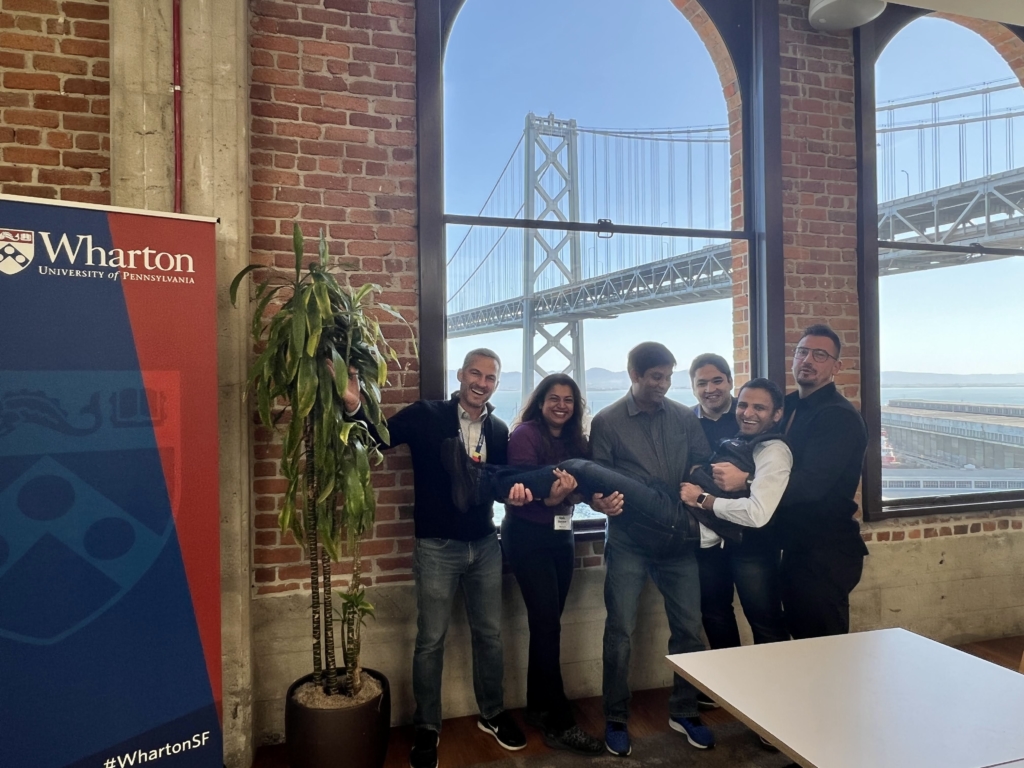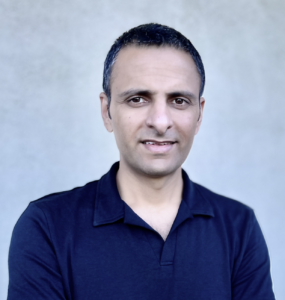
Tejinder Singh is hoisted by his Wharton EMBA learning team at the San Francisco campus. Courtesy photo
Just before beginning his executive MBA, Tejinder Singh, Ph.D., attended an introductory presentation by a program alum.
At any given time, the alum told the audience, you will be juggling three pressing commitments: work, family, and Wharton. And, at any given time, you will be failing at one out of the three.
“So, you have to find a way to balance that and prioritize,” says Singh, a global product manager at Applied Materials, a semiconductor equipment company with a market cap of close to $100 billion. Singh is also a father of two children under the age of 7, and husband to a nursing student. And he is an EMBA candidate at Wharton San Francisco set to graduate in April 2023.
“I would say I have prioritized Wharton because I wanted to get the best out of Wharton for these two years. I’ll be working all my life, and my family will be there with me. My wife is very supportive,” he tells Poets&Quants.
His strategy seems to be working. At the time of our interview, Singh was the top ranked student in his class, with a GPA of 4.0. He is also building a startup with a Wharton colleague.
We recently spoke with Singh about balancing work, family, and one of the toughest EMBA programs out there in the interview below. Our conversation has been edited for length and clarity.
Tell me a bit about your background and experience.
I come from a very small town in northern India. I grew up not knowing that I’d end up here, because as a child coming out from that Northern India town, coming to the U.S., going to Wharton, it’s been an incredible journey.

Tejinder Singh
From childhood, I’ve emphasized education in my life. I did chemical engineering in undergrad at the best engineering college, IIT Delhi, Indian Indian Institute of Technology. Then, I did my PhD in chemical engineering at University of Massachusetts Amherst and graduated in 2010. The last 12 years or so, I’ve been in the semiconductor industry, grew up in the ranks, and I’ve got a verbal approval that I’ll be a director this year.
Then last year, I joined Wharton. I was mostly on a technical route in my career, and I just felt like my strengths are more on the business side. I wanted to get more leadership roles, wanted to lead an organization or maybe to start my own business.
Wharton has been an eye opening experience. When I got admitted, I was not sure about myself — Who am I? What are my strengths? I am now the top student in my class out of the 101 students. I have a perfect GPA, 4.0. The top 5% of the class are named Palmer Scholars, and everybody tells me I will be a Palmer. That is so amazing to me, but I’m not taking it for granted because the class is very competitive. Everybody’s an accomplished professional.
It’s hard work and it requires a lot of discipline. It requires a strong support system. I’m a father of two kids, and my wife goes to nursing school, so we have a lot going on.
Tell me about your decision making process in regards to business school. Did you consider a full-time MBA? What made you choose an executive program?
I did look into a full-time MBA, but that program is catered more for professionals who are a little bit younger, somebody who has three to five years of experience. I already had a PhD and almost 11 years of experience, right in the range of a mid-career professional who’s looking to grow and take more leadership roles. That’s why the Executive MBA fit perfectly to what I was looking for.
Did you consider other schools? Why Wharton?
I did get admitted into Berkeley Haas, and I was waitlisted at Chicago Booth. But given the Wharton global brand, and I have a couple of classmates who already went there who were highly encouraging, I chose Wharton. So if you go outside the United States, if you go to Singapore or to India or to Asia, the Wharton brand is more recognizable.
Next Page: How to balance family and school + Finding a passion for entrepreneurship





Questions about this article? Email us or leave a comment below.